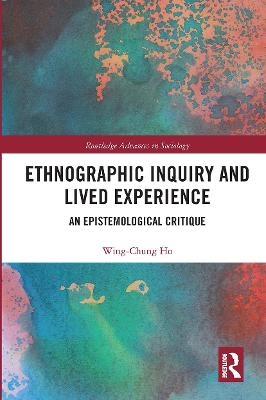
Ethnographic Inquiry and Lived Experience
An Epistemological Critique
Seiten
2020
Routledge (Verlag)
978-0-367-66295-0 (ISBN)
Routledge (Verlag)
978-0-367-66295-0 (ISBN)
- Titel z.Zt. nicht lieferbar
- Versandkostenfrei
- Auch auf Rechnung
- Artikel merken
This book offers refreshed epistemological guidelines for conducting ethnographic research for scientific reasoning. More importantly, it also provides a crucial knowledge base for comprehending the current epistemological debates inherent in the production of ethnographic knowledge and furthering discussions.
Ho addresses two fundamental theoretical questions about how best to practice ethnographic inquiries to obtain qualitative, experience-near, and shareable accounts of human living. The first question is regarding the epistemology of ethnography. Ho posits that writing is epistemologically prior to the researcher’s fieldwork experience in the production of ethnographic knowledge. This stance is developed using the theories of hermeneutics put forward by Paul Ricoeur and Hans-Georg Gadamer who both consider that once a text is produced, its meaning is dissociated from the intention of the author. The second question is: what is the putative object that the ethnographer writes about? Ho argues that "lived experience" (Erlebnis) offers such an ethnographic object. Since the lived experience that an ethnographer experiences during fieldwork cannot be studied directly, further theorizations of lived experience are necessary. Ho underscores both the non-discursivity and transcendence of lived experience in the lifeworld, and the way power is clandestinely imbued in everyday life in shaping subjectivity and practice. This theorization brings together Alfred Schutz’s lifeworld theory and Michel Foucault’s power/knowledge nexus. The result is a general theory of experience that is pertinent for ethnographic inquiries.
By addressing these two fundamental questions and offering novel angles from which to answer them, this book offers refreshed epistemological guidelines for conducting ethnographic research for scientific reasoning. More importantly, this book also provides a crucial knowledge base for comprehending the current epistemological debates inherent in the production of ethnographic knowledge and furthering discussions in the field.
Ho addresses two fundamental theoretical questions about how best to practice ethnographic inquiries to obtain qualitative, experience-near, and shareable accounts of human living. The first question is regarding the epistemology of ethnography. Ho posits that writing is epistemologically prior to the researcher’s fieldwork experience in the production of ethnographic knowledge. This stance is developed using the theories of hermeneutics put forward by Paul Ricoeur and Hans-Georg Gadamer who both consider that once a text is produced, its meaning is dissociated from the intention of the author. The second question is: what is the putative object that the ethnographer writes about? Ho argues that "lived experience" (Erlebnis) offers such an ethnographic object. Since the lived experience that an ethnographer experiences during fieldwork cannot be studied directly, further theorizations of lived experience are necessary. Ho underscores both the non-discursivity and transcendence of lived experience in the lifeworld, and the way power is clandestinely imbued in everyday life in shaping subjectivity and practice. This theorization brings together Alfred Schutz’s lifeworld theory and Michel Foucault’s power/knowledge nexus. The result is a general theory of experience that is pertinent for ethnographic inquiries.
By addressing these two fundamental questions and offering novel angles from which to answer them, this book offers refreshed epistemological guidelines for conducting ethnographic research for scientific reasoning. More importantly, this book also provides a crucial knowledge base for comprehending the current epistemological debates inherent in the production of ethnographic knowledge and furthering discussions in the field.
Wing-Chung Ho is an Associate Professor in the Department of Social and Behavioural Sciences at City University of Hong Kong.
Acknowledgements
Preface
Chapter 1: Introduction
Part I: Pinning down experience
Chapter 2: Epistemological break
Chapter 3: Ethnographic data and analysis
Chapter 4: Engaging realism
Part II: Expounding experience
Chapter 5: The non-discursive and transcendence
Further Illustration: Unveiling the taken-for-grantedness of the spousal sexual world
Chapter 6: The limit of the discursive
Further Illustration: A rejoinder to Gubrium, Holstein and Weinberg
Chapter 7: The experience-power interface
Chapter 8: Conclusion: Anti anti-ethnographic authority
Bibliography
Index
| Erscheinungsdatum | 01.10.2020 |
|---|---|
| Reihe/Serie | Routledge Advances in Sociology |
| Verlagsort | London |
| Sprache | englisch |
| Maße | 156 x 234 mm |
| Gewicht | 400 g |
| Themenwelt | Geisteswissenschaften ► Philosophie ► Erkenntnistheorie / Wissenschaftstheorie |
| Sozialwissenschaften ► Ethnologie | |
| Sozialwissenschaften ► Soziologie | |
| ISBN-10 | 0-367-66295-7 / 0367662957 |
| ISBN-13 | 978-0-367-66295-0 / 9780367662950 |
| Zustand | Neuware |
| Haben Sie eine Frage zum Produkt? |
Mehr entdecken
aus dem Bereich
aus dem Bereich
die Grundlegung der modernen Philosophie
Buch | Softcover (2023)
C.H.Beck (Verlag)
CHF 25,20
Buch | Softcover (2023)
Reclam, Philipp (Verlag)
CHF 9,80

![Was heißt Denken?. Vorlesung Wintersemester 1951/52. [Was bedeutet das alles?] - Martin Heidegger](/media/113619842)
